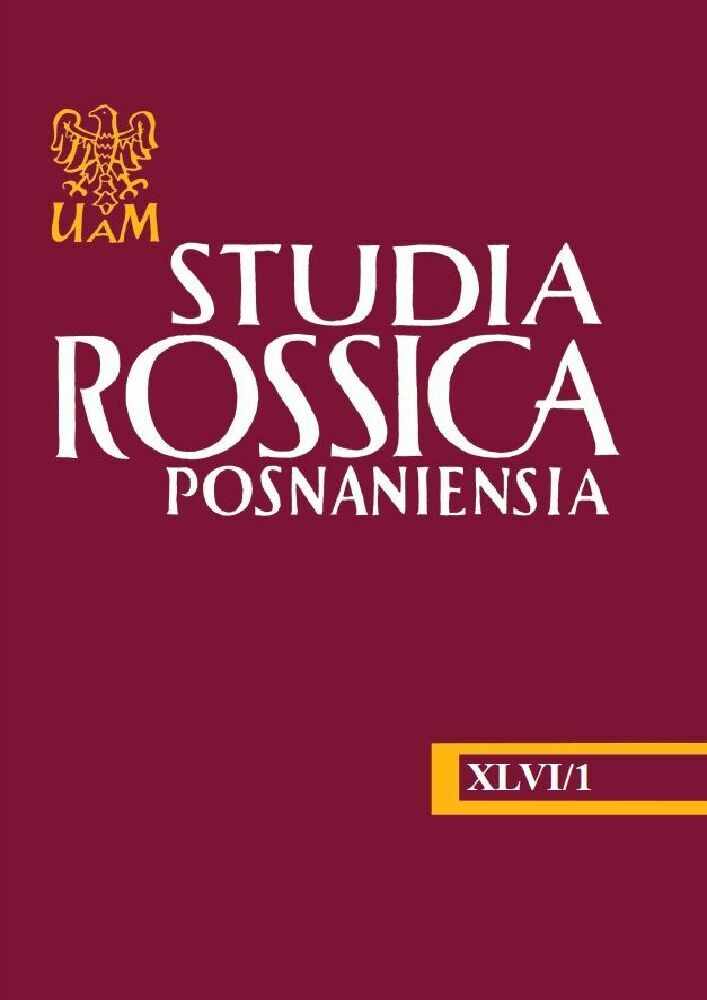Abstract
The article attempts to analyse the conceptualisation of the scientist-physicist based on the examples of selected reportages by Hanna Krall and Jacek Hugo-Bader. The analysis was conducted in an axiolinguistic key and its aim was to confirm the thesis about the important role of physicists in the Soviet axiosphere. It can be observed that in the axiological profile of a physicist, obtained on the basis of an empirical analysis, instrumental values dominate and these are closely connected with the fact that physicists are associated with political interests. Physicists, who function as objects of evaluation in the analysed reportages, are also a means of an indirect evaluation in relation to the political system in the USSR and reflect ways in which the country treats its citizens. The empirical material analysed allows us to conclude that within the Russian linguistic-cultural area, the physicist does not refer us only to a scientist dealing with a specific research discipline, but deserves to be called a concept that reflects a characteristic stage of the social and political life of the USSR, permanently inscribed into the axiosphere of that period.
Literaturhinweise
Arutûnova, Nina Davidovna. Tipy âzykovyh značenij: Ocenka. Sobytie. Fakt. Moskva, Nauka, 1988.
Chlebda, Wojciech. „O tekstowych wykładnikach wartościowania”. Przegląd Humanistyczny, 1, 2007, s. 25–34.
Dubisz, Stanisław, red. Uniwersalny słownik języka polskiego [edycja CD-ROM, wersja 1.0]. Wydawnictwo Naukowe PWN, 2004.
Frukacz, Katarzyna. Polski reportaż książkowy. Przemiany i adaptacje. Katowice, Wydawnictwo Uniwersytetu Śląskiego, 2019.
Gazda, Grzegorz, Słowinia Tynecka-Makowska, red. Słownik rodzajów i gatunków literackich. Kraków, Towarzystwo Autorów i Wydawców Prac Naukowych Universitas, 2006.
Hugo-Bader, Jacek. „Archipelag złotego deszczu”. „Magazyn”, 11. Gazeta Wyborcza, 64, 16.03.2000.
Hugo-Bader, Jacek. W rajskiej dolinie wśród zielska. Wołowiec, Wydawnictwo Czarne, 2010.
Ignatova, Mariâ Petrovna. „«Fiziki» i «liriki»: dve kulʹtury včera i segodnâ”. Izvestiâ Saratovskogo universiteta. Novaâ seriâ. Seriâ: Filosofiâ. Psihologiâ. Pedagogika, 15, 3, 2015, s. 17–20.
Ings, Simon. Stalin i naukowcy. Historia geniuszu i szaleństwa. Warszawa, Wydawnictwo Agora, 2017.
Karaulov, Ûrij Nikolaevič et al., red. Russkij associativnyj slovarʹ. Tom 1. Moskva, Astrelʹ, 2002.
Kot, Wiesław. Hanna Krall. Poznań, Dom Wydawniczy Rebis, 2000.
Krall, Hanna. Na wschód od Arbatu. Warszawa, Wydawnictwo Dowody na Istnienie, 2014.
Lappo, Georgij Mihajlovič, Pavel Markovič Polân. „Naukogrady Rossii: včerašnie zapretnye i poluzapretnye goroda – segodnâšnie točki rosta”. Mir Rossii, 1, 2008, s. 20–49. Web. 22.04.2020. http://elib.biblioatom.ru/text/lappo_naukogrady-rossii_2008/go,0/.
Postanovlenie GOKO № 9887ss/op „O Specialʹnom komitete pri GOKO”. Web. 23.04.2020. http://school.rusarchives.ru/atomnyi-proekt-v-sssr/postanovlenie-goko-9887ss-o-spetsialnom-komitete-pri-goko.html.
Puzynina, Jadwiga. Język wartości. Warszawa, Wydawnictwo Naukowe PWN, 1992.
Radziecki program nuklearny. Web. 21.04.2020. https://pl.wikipedia.org/wiki/Radziecki_program_nuklearny.
Serebrennikova, Evgeniâ Fedorovna et al. Lingvistika i aksiologiâ: ètnosemiometriâ cennostnyh smyslov: kollektivnaâ monografiâ. Moskva, Tezaurus, 2011.
Sidorova, Galina Petrovna. „Cennostʹ professii v sovetskoj hozâjstvennoj kulʹture i obrazah massovogo iskusstva 1960–1980-h”. Čelovek i kulʹtura, 1, 2013, s. 61–91. Web. 15.05.2020. https://nbpublish.com/library_read_article.php?id=291.
Szczeklik, Andrzej. „Dwie kultury”. PAUza Akademicka. Tygodnik Polskiej Akademii Umiejętności, 55, 2009. Web. 25.04.2020. http://pauza.krakow.pl/55_1_2009.pdf.
Szczygieł, Mariusz. „Wstęp. Jak Hanna Krall myliła pogoń”. Hanna Krall. Na wschód od Arbatu. Warszawa, Wydawnictwo Dowody na Istnienie, 2014, s. 5–15.
Tokarski, Ryszard. Światy za słowami. Wykłady z semantyki leksykalnej. Lublin, Wydawnictwo Uniwersytetu Marii Curie-Skłodowskiej, 2013.
Volʹf, Elena Mihajlovna. Funkcionalʹnaâ semantika ocenki. Moskva, Nauka, 1985.
Lizenz
Die Veröffentlichung von Texten geschieht in Übereinstimmung mit der Creative-Commons-Lizenz:
Namensnennung-Nicht kommerziell-Share Alike 4.0 International - Creative Commons


